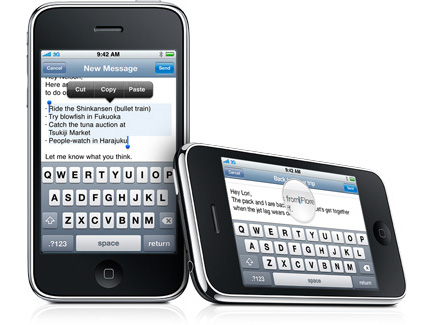The iPhone killer isn't a rival handset - it's O2
Opinion: No wonder iPhone owners are angry, says Gary Marshall

We're told that it costs between four and eight times more money to get a new customer than to retain an existing one, and that the way to make big piles of cash in the long term is to keep your customers sweet.
So why is O2 waving its corporate arse at its iPhone customers?
Twitter is already aflame with #o2fail messages from angry iPhone owners. They're angry that despite paying top whack for unlimited internet access, O2 wants an extra £14.68 (for 3GB) or £29.36 (10GB) per month if they want to use their iPhone as a modem.
And they're angry that there's no upgrade path for the new iPhone 3G S. If you bought your iPhone 3G on the day of release last year, you won't be able to upgrade until January 2010 without paying to end your contract.
Just whingers?
On the face of it, they're a bunch of whingers who seem unable to understand the concept of an 18-month contract. But there's more to it than that.
O2 should take their moans seriously for three good reasons.
Sign up for breaking news, reviews, opinion, top tech deals, and more.
The first is that O2 set a precedent with the iPhone 3G, enabling first-generation owners to upgrade for a reasonable price. In effect, O2 was saying to iPhone customers: "Yes, we know our contracts are 18 months, but we'll sort you out with a new iPhone when Apple releases the next version."
Had O2 told everyone to bugger off and wait for their contracts to expire last time, we very much doubt there'd be the anger we're seeing in forums and on Twitter. We know the reasons - the original iPhone wasn't subsidised but the 3G was - but that doesn't matter. O2 essentially sold the 3G to existing customers with a nudge, a wink and an implied promise of easy annual upgrades.
The second reason the lack of upgrades is a bad idea is that by January, it'll only be five months before the next iPhone is due. Savvy iPhone fans aren't going to commit to an 18-month or 24-month lock-in if they think the 3GS is about to be replaced - and unless they're demented, they're not going to upgrade now if they need to pay a big whack for the phone, pay several hundred quid to escape their current contract and commit to a contract that promises the same expense next summer.
The third reason is that O2's exclusivity has got to end some time. iPhone sales are handset driven, not network driven: people are going with O2 because that's where the iPhone is, not because they necessarily want to be with O2. That means O2 is storing up a great deal of resentment that's bound to come back and bite it when its exclusive deal with Apple ends.
The iPhone is first and foremost a luxury product, and yet O2 is betting that in the middle of a recession it can bring in enough new customers that existing ones won't matter.
If it's wrong, Apple might just discover that the "iPhone killer" isn't another handset: it's one of its business partners.
Update: O2 has responded to these criticisms in an exclusive interview with TechRadar

Contributor
Writer, broadcaster, musician and kitchen gadget obsessive Carrie Marshall has been writing about tech since 1998, contributing sage advice and odd opinions to all kinds of magazines and websites as well as writing more than twenty books. Her latest, a love letter to music titled Small Town Joy, is on sale now. She is the singer in spectacularly obscure Glaswegian rock band Unquiet Mind.